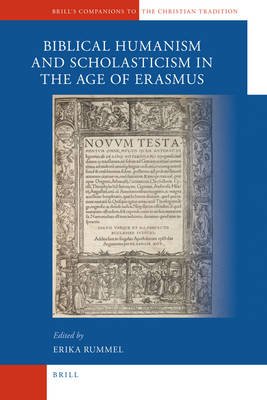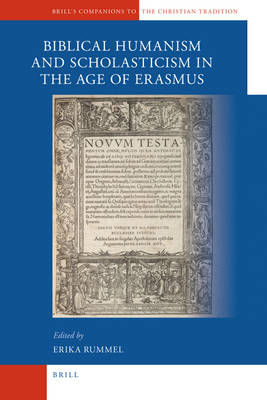
- Afhalen na 1 uur in een winkel met voorraad
- Gratis thuislevering in België vanaf € 30
- Ruim aanbod met 7 miljoen producten
- Afhalen na 1 uur in een winkel met voorraad
- Gratis thuislevering in België vanaf € 30
- Ruim aanbod met 7 miljoen producten
Zoeken
A Companion to Biblical Humanism and Scholasticism in the Age of Erasmus
Erika Rummel
€ 314,45
+ 628 punten
Omschrijving
Throughout the Middle Ages dialectical disputation was the prevailing method of scholarly inquiry. In the fifteenth century, however, humanists challenged the scholastic method, proposing instead historical and philological approaches. This volume focuses on the polemic over the right approach to biblical studies. It describes manifestations of the controversy, ranging from its beginnings in quattrocento Italy to Germany, Spain, France, the Netherlands, and scholars associated with the papal court in the sixteenth century. Erasmus, the most prominent biblical humanist of his day, served as a lightning rod for many of the controversies discussed here and has also received much attention from modern scholars. The chapters offered here seek to lend a voice also to Erasmus' critics and to right the balance in a historical narrative that has traditionally favoured the humanists. Contributors are John Monfasani, Daniel Menager, Carlos del Valle Rodríguez, Alejandro Coroleu, Charles Fantazzi, Guy Bedouelle, James Farge, Cecilia Asso, Marcel Gielis, Paolo Sartori, Paul F. Grendler, Nelson H. Minnich, Ronald K. Delph
Specificaties
Betrokkenen
- Auteur(s):
- Uitgeverij:
Inhoud
- Aantal bladzijden:
- 334
- Taal:
- Engels
- Reeks:
- Reeksnummer:
- nr. 9
Eigenschappen
- Productcode (EAN):
- 9789004145733
- Verschijningsdatum:
- 25/06/2008
- Uitvoering:
- Hardcover
- Formaat:
- Genaaid
- Afmetingen:
- 165 mm x 244 mm
- Gewicht:
- 680 g

Alleen bij Standaard Boekhandel
+ 628 punten op je klantenkaart van Standaard Boekhandel
Beoordelingen
We publiceren alleen reviews die voldoen aan de voorwaarden voor reviews. Bekijk onze voorwaarden voor reviews.








